In the bustling world of hospitality, tipped employees are the backbone of many establishments, ensuring customers have a memorable dining experience. However, the nature of their work often exposes them to unique challenges and uncertainties. Short-term disability insurance emerges as a beacon of hope, providing a safety net for these individuals when illness or injury strikes, safeguarding their financial stability during trying times.
This comprehensive guide delves into the intricacies of short-term disability insurance, addressing the specific needs and concerns of tipped employees. From understanding the concept and its relevance to navigating eligibility requirements and calculating benefits, we aim to empower tipped employees with the knowledge and resources they need to make informed decisions about their insurance coverage.
Understanding Short-Term Disability Insurance for Tipped Employees

Short-term disability insurance is a form of insurance that provides income replacement for employees who are unable to work due to a disability. This insurance is particularly relevant to tipped employees, who often rely on their tips to supplement their hourly wages.
Tipped employees face unique challenges in obtaining disability insurance. Because their income is variable and dependent on tips, it can be difficult to determine their average monthly earnings, which is the basis for calculating disability benefits. Additionally, tipped employees may be less likely to have access to employer-sponsored disability insurance plans.
Challenges in Obtaining Disability Insurance for Tipped Employees
Tipped employees face several challenges in obtaining disability insurance, including:
- Variable Income: Tipped employees’ income is often variable and unpredictable, making it difficult to determine their average monthly earnings, which is the basis for calculating disability benefits.
- Lack of Employer-Sponsored Plans: Tipped employees are less likely to have access to employer-sponsored disability insurance plans, as many employers do not offer these plans to tipped employees.
- Exclusions for Pre-Existing Conditions: Disability insurance policies often exclude coverage for pre-existing conditions, which can be a particular challenge for tipped employees who may have pre-existing health conditions due to the physical demands of their jobs.
Overcoming Challenges and Securing Disability Insurance
Despite the challenges, there are steps that tipped employees can take to overcome these obstacles and secure disability insurance:
- Document Income: Tipped employees should keep detailed records of their income, including tips, to help determine their average monthly earnings.
- Explore Individual Disability Insurance Plans: Tipped employees who do not have access to an employer-sponsored disability insurance plan can purchase an individual disability insurance policy.
- Consider Guaranteed Issue Policies: Guaranteed issue disability insurance policies do not require a medical exam and are available to all applicants, regardless of their health status.
- Review Policy Exclusions and Limitations: Tipped employees should carefully review the exclusions and limitations of any disability insurance policy before purchasing it to ensure that they understand the coverage and benefits provided.
Benefits and Coverage
Short-term disability insurance for tipped employees provides a range of benefits and coverage options tailored to address the unique challenges faced by this workforce. These benefits help tipped employees protect their income and financial stability in the event of a temporary disability that prevents them from working.
Benefits of Short-Term Disability Insurance for Tipped Employees
- Income Replacement: This benefit provides a portion of an employee’s lost wages during the period of disability, typically ranging from 40% to 70% of their average weekly earnings.
- Tax-Free Benefits: Short-term disability benefits are generally not subject to federal or state income taxes, offering a significant financial advantage over other forms of income replacement.
- Coverage for a Wide Range of Disabilities: Short-term disability insurance covers a broad spectrum of disabilities, including illnesses, injuries, and accidents that temporarily prevent an employee from performing their job duties.
- Job Protection: Short-term disability insurance helps ensure that tipped employees can retain their job while recovering from a disability, eliminating the risk of losing their employment due to an unexpected absence.
Coverage Options for Short-Term Disability Insurance
Short-term disability insurance policies for tipped employees typically offer a range of coverage options to meet individual needs and preferences:
- Benefit Period: The length of time an employee can receive disability benefits, typically ranging from 13 to 52 weeks.
- Waiting Period: The period of time between the onset of a disability and the start of benefit payments, typically ranging from 0 to 14 days.
- Elimination Period: The period of time between the start of a disability and the start of benefit payments, typically ranging from 0 to 7 days.
- Benefit Amount: The percentage of an employee’s average weekly earnings that they will receive as a benefit, typically ranging from 40% to 70%.
Examples of Common Scenarios Where Tipped Employees May Benefit from Short-Term Disability Insurance
Short-term disability insurance can provide valuable support for tipped employees in various situations:
- Unexpected Illness: A tipped employee who becomes ill with a severe flu or pneumonia may be unable to work for several weeks, resulting in a significant loss of income. Short-term disability insurance can provide a financial safety net during this period, ensuring that the employee can continue to meet their living expenses.
- Injury at Work: A tipped employee who suffers an injury while on the job may be unable to work for an extended period, potentially jeopardizing their income and job security. Short-term disability insurance can provide income replacement during the recovery period, helping the employee maintain financial stability and avoid financial hardship.
- Pregnancy and Childbirth: Tipped employees who become pregnant may need to take time off work for childbirth and recovery. Short-term disability insurance can provide income replacement during this period, allowing the employee to focus on their health and the well-being of their newborn child.
Eligibility Requirements
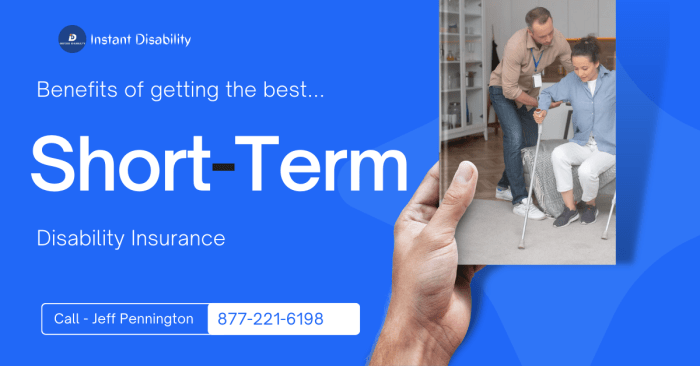
In order to qualify for short-term disability insurance, tipped employees must meet certain eligibility criteria. These criteria vary from state to state, but there are some general requirements that apply to most tipped employees.
The most common eligibility requirement is that the employee must have worked a certain number of hours or earned a certain amount of money in the past year. For example, in California, tipped employees must have worked at least 680 hours or earned at least $1,300 in tips in the past year to be eligible for short-term disability insurance.
Additional Requirements
In addition to the general eligibility requirements, there may be additional requirements that apply to tipped employees. For example, some states require tipped employees to have been employed by the same employer for a certain period of time before they are eligible for short-term disability insurance.
Other states may require tipped employees to have a certain amount of work experience in the tipped industry.
Calculating Benefits
Calculating disability benefits for tipped employees involves determining the amount of income they are entitled to receive while unable to work due to a disability.
There are two common methods used to calculate disability benefits for tipped employees:
1. Average Weekly Wage Method
The average weekly wage method calculates benefits based on the employee’s average weekly earnings over a specified period before the disability began. This period is typically the 13 weeks immediately preceding the disability.
To calculate the average weekly wage, all earnings from employment are added together, including tips, wages, commissions, and bonuses. This total is then divided by the number of weeks in the period to determine the average weekly wage.
Example:
An employee earns $200 in wages, $100 in tips, and $50 in commissions each week. Over the 13 weeks before the disability began, the employee earned a total of $4,100. The average weekly wage is calculated as ($200 + $100 + $50) / 13 = $269.23.
2. High-Quarter Method
The high-quarter method calculates benefits based on the employee’s highest-earning quarter during the four quarters immediately preceding the disability.
To calculate the high-quarter earnings, all earnings from employment are added together for the quarter. This total is then divided by the number of weeks in the quarter to determine the average weekly wage.
Example:
An employee earns $200 in wages, $100 in tips, and $50 in commissions each week. In the four quarters before the disability began, the employee earned $4,100 in the first quarter, $4,500 in the second quarter, $4,800 in the third quarter, and $5,000 in the fourth quarter.
The high-quarter earnings are $5,000.
Filing a Claim
Filing a short-term disability claim as a tipped employee involves several key steps and requires specific documentation. It’s crucial to follow the process carefully to ensure a smooth and timely claim experience.
Required Documentation and Information
Before initiating the claim process, gather the following essential documents and information:
- Proof of Employment: Pay stubs, W-2 forms, or an employment verification letter from your employer.
- Medical Records: Provide medical records, test results, and doctor’s notes that support your disability claim.
- Employer’s Policy: Review your employer’s short-term disability policy to understand the specific requirements and procedures.
- Personal Information: Have your Social Security number, contact information, and bank account details ready.
Factors Influencing Premiums

The premium rates for short-term disability insurance for tipped employees are determined by various factors. Understanding these factors can help employers and employees make informed decisions about their insurance coverage and budget.
One of the primary factors affecting premiums is the employee’s annual income . Since tipped employees often have variable earnings, the insurance company considers their base wage, tips, and other forms of compensation when calculating the premium. A higher annual income generally leads to higher premiums, as the insurance company assumes a greater risk of having to pay out benefits.
Age and Health Status
Another important factor is the employee’s age and health status . Younger and healthier employees typically pay lower premiums because they are considered to be at a lower risk of becoming disabled. As employees age, their risk of disability increases, and so do their premiums.
Similarly, employees with pre-existing health conditions may be charged higher premiums due to the increased likelihood of a disability claim.
Occupation and Job Duties
The employee’s occupation and job duties also influence premium rates. Employees in physically demanding jobs or those involving hazardous activities are generally subject to higher premiums. This is because they are more likely to experience a work-related injury or illness that could lead to a disability.
Waiting Period and Benefit Duration
The waiting period and benefit duration selected by the employer or employee can also impact premiums. A shorter waiting period (the time between the onset of disability and the start of benefit payments) and a longer benefit duration (the period during which benefits are paid) typically result in higher premiums.
This is because the insurance company assumes a greater financial risk.
State Regulations and Insurance Market
State regulations and the insurance market can also influence premium rates. In some states, there are mandated minimum coverage requirements for short-term disability insurance, which can affect pricing. Additionally, the level of competition among insurance companies in a particular state can impact premiums, as insurers may offer lower rates to attract customers.
Choosing the Right Policy
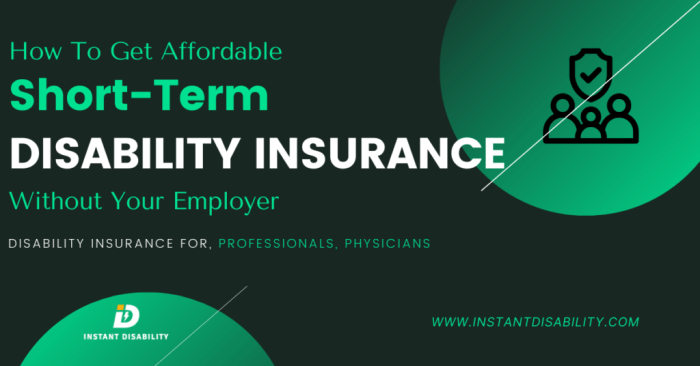
When selecting a short-term disability insurance policy, tipped employees should consider several factors to ensure they choose the one that best meets their needs and financial situation. Evaluating different policies and making an informed decision is crucial.
Policy Coverage and Benefits
- Review the policy’s coverage: Understand the types of disabilities covered, the duration of benefits, and any exclusions or limitations.
- Compare benefit amounts: Consider the maximum benefit amount and the percentage of income that will be replaced during a disability.
- Look for additional benefits: Some policies offer additional benefits, such as rehabilitation assistance, job placement assistance, or coverage for partial disabilities.
Waiting Period
The waiting period is the time between the onset of a disability and the start of benefit payments. Consider policies with a shorter waiting period, especially if you have limited savings or income.
Premiums
- Compare premiums: Obtain quotes from multiple insurance companies to compare premiums and find the most affordable option.
- Consider premium payment options: Some policies allow for monthly or quarterly premium payments, which can be more manageable for tipped employees with fluctuating incomes.
Insurance Company Reputation and Financial Stability
Choose an insurance company with a strong reputation and financial stability to ensure they can fulfill their obligations under the policy.
Customer Service and Claims Process
- Research the insurance company’s customer service: Read reviews and ask for recommendations to ensure they have a responsive and helpful customer service team.
- Understand the claims process: Familiarize yourself with the claims process and any necessary documentation to ensure a smooth and efficient claims experience.
Employer’s Role
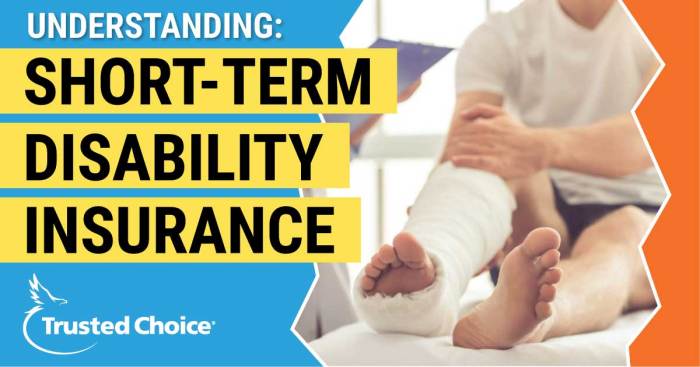
In the realm of short-term disability insurance, employers play a pivotal role in ensuring the well-being of their tipped employees. By providing this coverage, employers not only fulfill their legal obligations but also reap the benefits of a productive and engaged workforce.
The decision to offer short-term disability insurance to tipped employees comes with both potential benefits and challenges. On the one hand, employers may enjoy increased employee morale, reduced absenteeism, and a sense of loyalty among their workforce. On the other hand, they may face additional costs associated with premiums and administrative tasks.
Benefits for Employers
-
Increased Employee Morale:
Offering short-term disability insurance demonstrates an employer’s commitment to the well-being of its employees, leading to higher job satisfaction and increased morale. -
Reduced Absenteeism:
When employees know they have financial protection in case of an illness or injury, they are more likely to return to work sooner, reducing absenteeism and its associated costs. -
Enhanced Employee Loyalty:
Providing short-term disability insurance signals to employees that they are valued members of the team, fostering loyalty and a sense of belonging. -
Improved Productivity:
Employees who are financially secure and have peace of mind are more likely to be focused and productive at work. -
Positive Employer Reputation:
Offering short-term disability insurance can enhance an employer’s reputation as a caring and responsible organization, attracting and retaining top talent.
Challenges for Employers
-
Additional Costs:
Providing short-term disability insurance involves additional expenses, including premiums, administrative fees, and potential claims payments. -
Complexity of Administration:
Managing short-term disability insurance programs can be complex, requiring employers to stay updated on regulations, handle claims processing, and ensure compliance. -
Potential Fraud:
Employers may face the risk of fraudulent claims, which can lead to increased costs and administrative burdens. -
Varying State Regulations:
Short-term disability insurance regulations vary from state to state, requiring employers to navigate different rules and requirements.
State-Specific Regulations
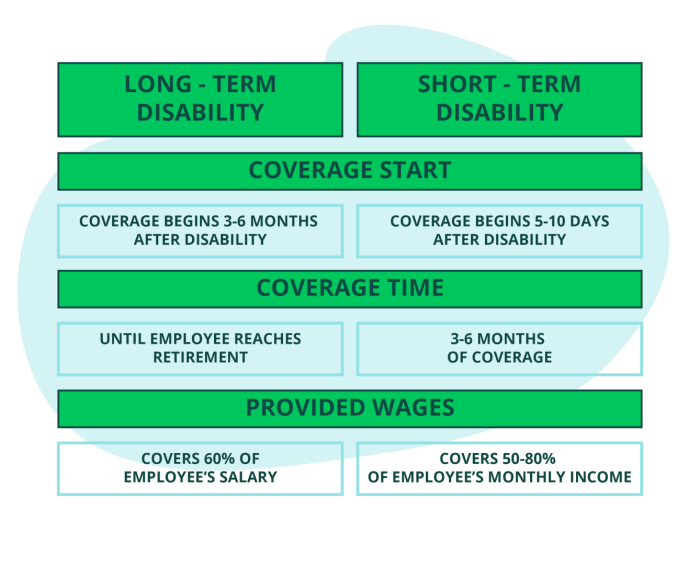
State-specific regulations and laws impact short-term disability insurance coverage for tipped employees, varying across jurisdictions. These regulations address eligibility requirements, benefit amounts, and other aspects of the insurance.
Unique Requirements and Provisions
Some states have unique requirements or provisions for short-term disability insurance coverage for tipped employees. For example:
- California: California law requires employers to provide short-term disability insurance to all employees, including tipped employees, who work at least 30 hours per week.
- New York: New York law requires employers to provide short-term disability insurance to all employees, including tipped employees, who work at least 20 hours per week.
- Washington: Washington law requires employers to provide short-term disability insurance to all employees, including tipped employees, who work at least 820 hours per year.
These are just a few examples of the state-specific regulations and laws that impact short-term disability insurance coverage for tipped employees. Employers and employees should be aware of the specific requirements and provisions in their state to ensure compliance with the law.
Case Studies and Examples

Exploring real-life scenarios showcases the practical benefits of short-term disability insurance for tipped employees, highlighting its positive impact in various situations.
Tipped Server with a Broken Leg
Sarah, a dedicated server at a local restaurant, unfortunately slipped and broke her leg while on the job. As a result, she was unable to work for several weeks. Fortunately, Sarah had short-term disability insurance, which provided her with a portion of her regular income during her recovery period.
This financial support helped Sarah cover her living expenses and medical bills, easing the burden of her temporary disability.
Bartender with a Back Injury
Tom, a skilled bartender, experienced a severe back injury while lifting heavy boxes at work. Due to the injury, he was unable to continue his bartending duties. Tom’s short-term disability insurance came to his rescue, offering him a percentage of his usual earnings while he underwent physical therapy and recovered from his injury.
This coverage ensured Tom could maintain financial stability during his temporary disability.
Cook with a Hand Burn
Working in a busy kitchen, Maria, a talented cook, suffered a hand burn while handling hot cookware. The burn required surgery and extensive rehabilitation, preventing Maria from returning to work for a significant period. Fortunately, Maria had short-term disability insurance, which provided her with a portion of her income while she recovered from the injury.
This financial support helped Maria focus on her healing process without the added stress of financial burden.
Summary
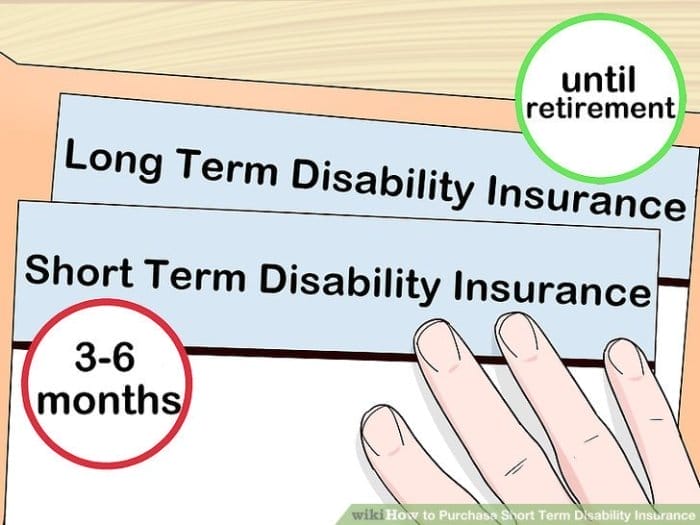
Short-term disability insurance serves as a lifeline for tipped employees, providing a crucial financial safety net during periods of temporary disability. Understanding the intricacies of this insurance, from eligibility criteria to claim filing processes, empowers tipped employees to safeguard their livelihoods and navigate unforeseen challenges with greater confidence.
As the hospitality industry continues to evolve, so too must the insurance landscape, ensuring that tipped employees have access to comprehensive and tailored coverage that meets their unique needs.
Questions and Answers
What are the unique challenges faced by tipped employees in obtaining disability insurance?
Tipped employees often face challenges in obtaining disability insurance due to the fluctuating nature of their income and the difficulty in accurately calculating their earnings. Additionally, the lack of traditional employer-sponsored coverage may limit their access to affordable and comprehensive insurance options.
Can tipped employees receive short-term disability benefits if they are unable to work due to a non-work-related injury or illness?
Yes, short-term disability insurance typically covers both work-related and non-work-related disabilities. However, the specific coverage and eligibility criteria may vary depending on the insurance policy and the state in which the employee resides.
How are disability benefits calculated for tipped employees?
Disability benefits for tipped employees are typically calculated based on a percentage of their average weekly earnings, including both base wages and tips. The specific calculation method may vary depending on the insurance policy and state regulations.
What is the role of employers in providing short-term disability insurance to tipped employees?
Employers play a crucial role in providing short-term disability insurance to tipped employees. They can offer group coverage through their workplace, which may provide more affordable rates and streamlined enrollment processes for employees. Additionally, employers can educate their employees about the importance of disability insurance and assist them in understanding their coverage options.



